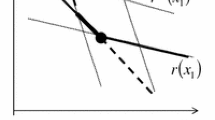Summary
There exists an extensive literature about economies with price rigidities, where some constraints on the set of admissible price systems are exogenously given. In this paper a general equilibrium model extended by a political system is described where the price rigidities are endogenously chosen by political candidates. Sufficient conditions for the existence of a mixed strategy and a pure strategy equilibrium are given. Finally an example is discussed, where in equilibrium both political candidates propose price rigidities excluding the Walrasian equilibrium price system.
Similar content being viewed by others
References
Bénassy, J.-P.: Neo-Keynesian disequilibrium theory in a monetary economy. Review of Economic Studies42, 503–523 (1975)
Böhm, V., Maskin, E., Polemarchakis, H., Postlewaite, A.: Monopolistic quantity rationing. Quarterly Journal of Economics98, 189–197 (1983)
Comanor, W. S.: The median voter rule and the theory of political choice. Journal of Public Economics5, 169–177 (1976)
Coughlin, P. J.: Elections and income redistribution. Public Choice50, 27–99 (1986)
Coughlin, P. J., Mueller, D. C., Murrell, P.: Electoral politics interest groups, and the size of government. Economic Inquiry28, 682–705 (1990)
Coughlin, P. J., Nitzan, S.: Electoral outcomes with probabilistic voting and Nash social welfare maxima. Journal of Public Economics15, 113–121 (1981a)
Coughlin, P. J., Nitzan, S.: Directional and local electoral equilibria with probabilistic voting. Journal of Economic Theory24, 226–239 (1981b)
Cox, C. C.: The enforcement of public price controls. Journal of Political Economy88, 887–916 (1980)
Dasgupta, P., Maskin, E.: The existence of equilibrium in discontinuous economic games, I: theory. Review of Economic Studies53, 1–26 (1986)
Debreu, G.: Theory of value. New Haven: Yale University Press 1959
Debreu, G.: Excess demand functions. Journal of Mathematical Economics1, 15–21 (1974)
Drèze, J.: Existence of an exchange equilibrium under price rigidities. International Economic Review16, 301–320 (1975)
Feldman, A. M., Lee, K.-H.: Existence of electoral equilibria with probabilistic voting. Journal of Public Economics35, 205–227 (1988)
Ginsburgh, V. A., Heyden, L. Van der: On extending the Negishi approach to computing equilibria: the case of government price support policies. Journal of Economic Theory44, 168–178 (1988)
Glicksberg, I. L.: A further generalization of the Kakutani fixed point theorem, with application to Nash equilibrium points. Proceedings of the American Mathematical Society3, 170–174 (1952)
Grandmont, J.-M.: Temporary general equilibrium theory. In: Arrow, K. J., Intrilligator, M.D. (eds.) Handbook of mathematical economics, vol. II. Amsterdam: North-Holland 1982
Hart, O. D.: A model of imperfect competition with Keynesian features. Quarterly Journal of Economics97, 109–138 (1982)
Hildenbrand, W., Kirman, A. P.: Equilibrium analysis, variations on themes by Edgeworth and Walras. Amsterdam: North-Holland 1988
Hinich, M. J.: Equilibrium in spatial voting: the median voter result is an artifact. Journal of Economic Theory16, 208–219 (1977)
Hinich, M. J., Ledyard, J. O., Ordeshook, P. C.: Nonvoting and the existence of equilibrium under majority rule. Journal of Economic Theory4, 144–153 (1972)
Hinich, M. J., Ordeshook, P. C.: Abstentions and equilibrium in the electoral process. Public Choice7, 81–106 (1969)
Hinich, M. J., Ordeshook, P. C.: Social welfare and electoral competition in democratic societies. Public Choice11, 73–87 (1971)
Kramer, G. H.: On a class of equilibrium conditions for majority rule. Econometrica41, 285–297 (1973)
Levy, S.: The short-term macroeconomic effects of price controls. Journal of Policy Modeling13, 157–184 (1991)
Madden, P.: Keynesian unemployment as a Nash equilibrium with endogenous wage/price setting. Economics Letters12, 109–114 (1983)
McKelvey, R. D., Ordeshook, P. C.: Symmetric spatial games without majority rule equilibria. The American Political Science Review70, 1172–1184 (1976)
Nguyen, T. T., Whalley, J.: Equilibrium under price controls with endogenous transactions costs. Journal of Economic Theory39, 290–300 (1986)
Nguyen, T. T., Whalley, J.: General equilibrium analysis of price controls: a computational approach. International economic Review31, 667–684 (1990)
Silvestre, J.: Fixprice analysis in exchange economies. Journal of Economic Theory26, 28–58 (1982)
Silvestre, J.: Undominated prices in the three good model. European Economic Review32, 161–178 (1988)
Wittman, D.: Multi-candidate equilibria. Public Choice43, 287–291 (1984)
Younès, Y.: On the role of money in the process of exchange and the existence of a Non-Walrasian equilibrium. Review of Economic Studies42, 489–501 (1975)
Author information
Authors and Affiliations
Additional information
The author would like to thank Dolf Talman, Pieter Ruys, Jan van Geldrop, and an anonymous referee for their valuable comments on previous drafts of this paper. The author is financially supported by the Cooperation Centre Tilburg and Eindhoven Universities, The Netherlands. This research is part of the VF-program “Competition and Cooperation”.
Rights and permissions
About this article
Cite this article
Herings, P.JJ. Endogenously determined price rigidities. Econ Theory 9, 471–498 (1997). https://doi.org/10.1007/BF01213850
Received:
Revised:
Issue Date:
DOI: https://doi.org/10.1007/BF01213850




